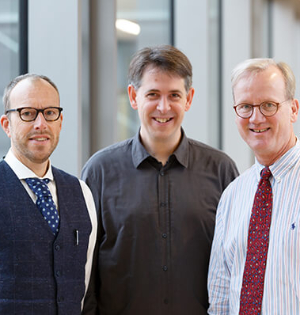The KiTZ directorate
The KiTZ Directorate, consisting of Andreas Kulozik, Olaf Witt and Stefan Pfister, manages the KiTZ and ensures the development of strategic measures, as well as their operational implementation.
KiTZ programs
At KiTZ, new diagnostic and therapeutic methods against childhood cancer are being developed. This is only possible if research and clinic work hand in hand. To ensure this, KiTZ is divided into three programs: the clinical, the translational and the preclinical program.
The KiTZ program I "Clinical Pediatric Oncology" (headed by Prof. Dr. Andreas Kulozik) covers outpatient, day-clinic and in-patient clinical care as well as conducting clinical trials for our patients with cancer and severe blood diseases.
Focal points program I
- Integral, age-appropriate therapy of children and adolescents with the entire spectrum of malignant diseases and severe non-malignant blood diseases
-
Leukemia: Novel approaches for treatment in close cooperation with the research group Muckenthaler
-
Osteosarcoma: Novel strategies of medicinal and local theraphy
- Hemoglobin dieseases: Novel treatment concepts for patients suffering from thalassemia and sickle cell disease in the "Thalassemia and Sickle Cell Center Rhein-Neckar"
The KiTZ program II "Translational Pediatric Oncology" (headed by Prof. Dr. Olaf Witt) comprises innovative individualized forms of treatment for children with malignant diseases. The focus is on the translation of new research findings into early clinical trials - especially for patients who did not benefit from established therapies. For this purpose, a study unit was set up at the KiTZ, the "Clinical Trial Unit". There, young patients get access to new, targeted treatment options.
Focal points program II
- KiTZ Clinical Trial Unit
- Pediatric brain tumors with second opinion board
- Development of innovative phase I/II clinical trials
- "Compassionate Use" treatment based on molecular information
The KiTZ program III "Preclinical Pediatric Oncology" (headed by Prof. Dr. Stefan Pfister) combines experimental pediatric oncology research groups from the DKFZ and the University Hospital. The aim is to develop new diagnostic methods for the classification of tumor diseases, to identify new mechanisms of tumorigenesis, and to derive therapeutic approaches from them. The researchers of the KiTZ pay particular attention to the identification and characterization of new genetic and epigenetic structures that could be associated with the development of childhood cancers. These will be used as targets for drug therapies or as diagnostic targets.
Focal points program III
- Preclinical and translational research
- Administration of the INFORM register
- Molecular diagnostics, genome analysis for the
- identification of novel therapies
- specification of tumor diagnostics
- individualization of therapy approaches

